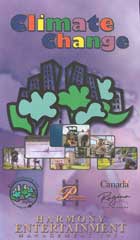
Climate Change 2000
Distributed by National Film Board of Canada, 1123 Broadway, Suite 307, New York, NY 10010; 800-542-2164
Produced by Gary Niesner in cooperation with the City of Regina. Regina, Saskatchewan, Canada
Directed by Chris Triffo
VHS, color, 9 min.
K-6
Environmental Studies, Science
Date Entered: 05/27/2005
Reviewed by Meghann Matwichuk, Morris Library, University of DelawareClimate Change is a short production geared towards children and made available by the city of Regina in Saskatchewan. Two narrators, a teenage boy and a young girl, discuss the importance of changes in the earth's climate. They provide succinct explanations of how greenhouse gasses set off reactions that can have profound effects on our ecosystem. Computer animations supply visualizations to help children understand concepts such as the greenhouse effect.
The narrators discuss how the burning of fossil fuels to provide energy causes potentially devastating changes in weather patterns. Statistics about how recent years have been the warmest in history are juxtaposed with visual aids to help children understand how drastic these changes are. The program winds up its discussion of the causes of global warming by pointing out how disproportionately westerners contribute to the increase of carbon dioxide in the atmosphere. The last segment offers several suggestions for reducing one's contribution to the problem: using energy-efficient products, limiting energy consumption, and talking with friends and family about the problem. Global initiatives attempting to address problems pertaining to greenhouse gasses are touched on as well. Regina's Cool Down the City campaign, for which this video was produced, is one manifestation of this initiative.
The video provides a solid introduction to the problems of global warming and greenhouse gasses. Suggestions for action are simple and age-appropriate. Since its main topics are more complicated than a brief program could explore, it would be most useful in the context of broader instruction and discussion. Climate Change would be a good addition to collections serving primary school environmental science curricula.